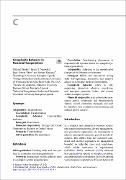| dc.contributor.author | Michael, Omeke | |
| dc.contributor.author | Pascal, T. Ngoboka | |
| dc.contributor.author | Isaac, Nabeta Nkote | |
| dc.contributor.author | Samuel, Mayanja | |
| dc.date.accessioned | 2023-04-18T09:48:01Z | |
| dc.date.available | 2023-04-18T09:48:01Z | |
| dc.date.issued | 2021 | |
| dc.identifier.citation | Omeke, M., Ngoboka, P. T., Nkote, I. N., & Mayanja, S. (2021). Complexity Behavior in Financial Cooperatives. | en_US |
| dc.identifier.uri | https://doi.org/10.1007/978-3-319-31816-5_4154-1 | |
| dc.identifier.uri | https://hdl.handle.net/20.500.12504/1317 | |
| dc.description.abstract | In a complex and competitive business ecosystem, market responsiveness, diverse management,
and governance approaches are instrumental to achieve sustainable enterprise growth and development. This differs from the traditional command and control approaches of management bounded to inflexible rules and regulations, which inhibit innovation in organizations (McMillan 2008). Anderson (1999) observed that organizations operate in complex, nonlinear, and unpredictable environment. In the developing world, financial cooperatives (FCs) are faced with competitive pressures and witness unpredictable changes in their business operations in the ever-changing business environment. | en_US |
| dc.language.iso | en | en_US |
| dc.publisher | Springer Nature Switzerland | en_US |
| dc.subject | Adaptability: | en_US |
| dc.subject | Financial cooperatives: | en_US |
| dc.subject | Savings and Credit: | en_US |
| dc.subject | Cooperatives Societies or Credit Unions: | en_US |
| dc.subject | Networks. | en_US |
| dc.subject | Co-evolution: | en_US |
| dc.subject | Complexity behavior: | en_US |
| dc.subject | Innovations: | en_US |
| dc.title | Complexity behavior in financial cooperatives | en_US |
| dc.type | Article | en_US |

